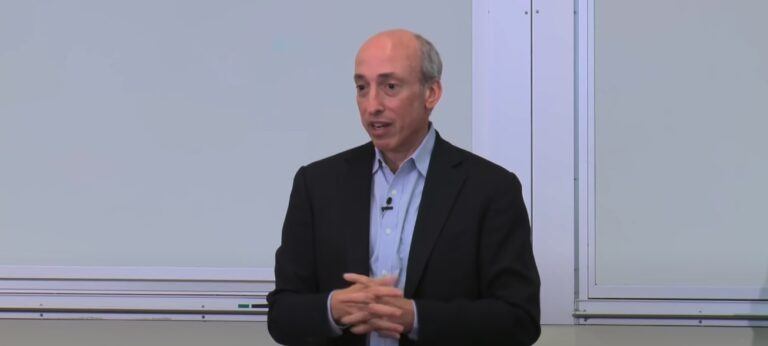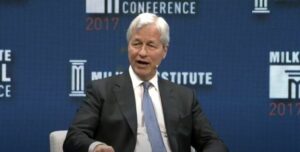
Earlier today, Gary Gensler, Chair of the U.S. Securities and Exchange Commission (SEC), appeared on CNBC’s “Squawk Box” to discuss with co-anchors Andrew Ross Sorkin and Joe Kernen the SEC’s recent approval of 11 spot Bitcoin ETFs.
Historic Decision and Court Influence
Gensler described the SEC’s decision as a response to a long-standing consideration dating back to former SEC Chair Jay Clayton’s tenure. He emphasized the role of the recent Grayscale court decision in shaping the SEC’s approach, stating that this was the most sustainable path forward, respecting the rule of law and court interpretations.
Investor Caution on Bitcoin
Gensler reiterated that the SEC’s approval does not equate to an endorsement of Bitcoin. He warned investors about the speculative and volatile nature of Bitcoin. Gensler stressed that Bitcoin is not widely used as a payment mechanism except in illicit activities, such as money laundering and sanction evasion.
Centralization and Monetary History
Gensler said that although Satoshi’s vision for Bitcoin was all about decentralization, spot Bitcoin ETFs have a lot of centralization. He also pointed out that despite its decentralized ledger, the production and control of Bitcoin are concentrated among a few entities.
Potential Regulation and Future of Cryptocurrencies
Gensler discussed the broader crypto field, highlighting issues of fraud and conflicts. He suggested that many crypto tokens are securities under the law and that platforms trading these tokens should comply with federal regulations.
<!–
–> <!–
–>
Response to Warren’s Criticism and Future Crypto Spot ETFs
Responding to criticism from figures like Senator Elizabeth Warren, Gensler expressed respect for differing opinions but reiterated his commitment to the law and court rulings. Regarding future cryptocurrency ETFs, such as those for Ethereum, he clarified that the SEC’s current stance is specific to Bitcoin as a non-security commodity, similar to gold. He did not indicate a proactive approach towards other cryptocurrencies but suggested that the decision on spot Bitcoin ETFs does not automatically set a precedent for others.
[embedded content]
On January 10, Jamie Dimon, the Chairman of the Board and CEO of global financial services firm JPMorgan Chase & Co., appeared on Fox Business’s “Mornings with Maria,” which is hosted by Maria Bartiromo. He discussed various topics, including the U.S. economy, impending bank regulations, and his views on cryptocurrency.
Dimon reiterated his critical stance on Bitcoin, citing its alleged use in illegal activities, such as tax evasion. He argued that the primary use cases of Bitcoin are not just buying and selling but are instead linked to illicit activities. He questioned the value of Bitcoin and suggested that if he were in government, he would consider shutting it down.
[embedded content]
At the Senate Banking Committee’s ‘Annual Oversight of Wall Street Firms’ hearing on 6 December 2023, Jamie Dimon expressed his deep skepticism towards cryptocurrencies, suggesting that the government should consider closing down the sector. He pointed out the risks of cryptocurrencies being used to bypass government oversight and their potential appeal to harmful actors.
Dimon, clearly opposed to cryptocurrencies including Bitcoin, stated, “I am fundamentally against crypto, bitcoin, and the like… If it were up to me, I would shut it down.” This aligns with his prior statements where he has been critical of Bitcoin and advocated for tighter regulations on stablecoins.
Amid increasing regulatory focus on the crypto industry in Washington, as reported by Sarah Wynn from The Block, Senator Elizabeth Warren is pushing for the Digital Asset Anti-Money Laundering Act. This act aims to extend Know Your Customer (KYC) regulations to various participants in the cryptocurrency industry.
During the hearing, Warren engaged with top bank CEOs, including Charles Scharf of Wells Fargo, Brian Moynihan of Bank of America, and David Solomon of Goldman Sachs, on the topic of cryptocurrency regulation. All of them unanimously agreed on the importance of imposing the same anti-money laundering standards on the crypto industry as are enforced in traditional banking.
Senator Warren, acknowledging the agreement among these banking leaders, stated that while she rarely finds common ground with them, she recognizes the necessity of collaborating on this issue, viewing it as a matter of national security.
[embedded content]
- SEO Powered Content & PR Distribution. Get Amplified Today.
- PlatoData.Network Vertical Generative Ai. Empower Yourself. Access Here.
- PlatoAiStream. Web3 Intelligence. Knowledge Amplified. Access Here.
- PlatoESG. Carbon, CleanTech, Energy, Environment, Solar, Waste Management. Access Here.
- PlatoHealth. Biotech and Clinical Trials Intelligence. Access Here.
- Source: https://www.cryptoglobe.com/latest/2024/01/sec-chair-gensler-discusses-approval-of-spot-bitcoin-etfs-in-his-first-interview-since-launch-day/
- :has
- :is
- :not
- :where
- $UP
- 10
- 11
- 2023
- 360
- 7
- a
- About
- Act
- activities
- actors
- Ads
- against
- agreed
- Agreement
- aims
- Aligns
- All
- alleged
- also
- Although
- am
- america
- among
- an
- and
- Andrew
- Andrew Ross Sorkin
- anti-money laundering
- appeal
- appeared
- approach
- approval
- ARE
- argued
- AS
- asset
- automatically
- back
- Bank
- Bank of America
- Banking
- been
- being
- Bitcoin
- Bitcoin ETF
- Block
- board
- Brian
- broader
- but
- Buying
- by
- bypass
- cases
- caution
- Centralization
- ceo
- CEOs
- Chair
- chairman
- Charles
- chase
- clarified
- clearly
- Close
- closing
- CO
- collaborating
- commission
- commitment
- commodity
- Common
- comply
- Concentrated
- conflicts
- Consider
- consideration
- content
- control
- Court
- critical
- criticism
- crypto
- Crypto Industry
- CRYPTO TOKENS
- cryptocurrencies
- cryptocurrency
- Cryptocurrency Industry
- cryptocurrency regulation
- CryptoGlobe
- Current
- customer
- Dating
- David
- December
- Decentralization
- decentralized
- decision
- deep
- described
- Despite
- DID
- differing
- digital
- Digital Asset
- Dimon
- discuss
- discussed
- does
- down
- economy
- elizabeth
- elizabeth warren
- embedded
- emphasized
- Endorsement..
- engaged
- entities
- ETF
- ETFs
- ethereum
- evasion
- Except
- exchange
- expressed
- extend
- Federal
- few
- field
- Figures
- financial
- financial services
- finds
- Firm
- Focus
- For
- Former
- Forward
- fox
- fraud
- from
- fundamentally
- future
- Gary
- Gary Gensler
- Gensler
- Global
- global financial
- Gold
- goldman
- Goldman Sachs
- Government
- Grayscale
- Ground
- harmful
- Have
- he
- hearing
- highlighting
- highly
- his
- hosted
- HTTPS
- i
- if
- Illegal
- illicit
- impending
- importance
- imposing
- in
- Including
- increasing
- indicate
- industry
- instead
- Investors
- issue
- issues
- IT
- ITS
- Jamie
- Jamie Dimon
- January
- JOE
- jpg
- JPMorgan
- jpmorgan chase
- just
- Know
- Know Your Customer
- KYC
- Laundering
- Law
- leaders
- Ledger
- like
- linked
- long-standing
- Lot
- many
- maria
- Matter
- me
- mechanism
- Monetary
- money
- Money Laundering
- most
- National
- national security
- Nature
- necessity
- of
- on
- only
- Opinions
- opposed
- Other
- Others
- out
- Oversight
- participants
- path
- payment
- payments
- Platforms
- plato
- Plato Data Intelligence
- PlatoData
- potential
- Precedent
- primary
- Prior
- Proactive
- Production
- Pushing
- Questioned
- rarely
- recent
- recognizes
- regarding
- Regulation
- regulations
- regulatory
- Reported
- respect
- respecting
- response
- risks
- Role
- Rule
- s
- Sachs
- Said
- same
- Sanction
- satoshis
- Screen
- screens
- SEC
- sec chair
- SEC Chair Gensler
- sector
- Securities
- Securities and Exchange Commission
- security
- Selling
- Senate
- senate banking
- Senator
- senator elizabeth warren
- Services
- set
- shaping
- she
- should
- shut
- similar
- sizes
- Skepticism
- specific
- speculative
- Spot
- Stablecoins
- stance
- standards
- stated
- statements
- stating
- street
- such
- sustainable
- tax
- Tax Evasion
- that
- The
- The Block
- the Law
- their
- Them
- These
- this
- those
- tighter
- time
- to
- today
- Tokens
- top
- topic
- Topics
- towards
- Trading
- traditional
- traditional banking
- u.s.
- U.S. economy
- U.S. Securities
- U.S. Securities and Exchange Commission
- unanimously
- under
- underlying
- us
- US economy
- use
- used
- value
- value of bitcoin
- various
- viewing
- views
- vision
- volatile
- Wall
- Wall Street
- warned
- warning
- warren
- was
- washington
- Wells
- Wells Fargo
- were
- which
- while
- widely
- with
- would
- Your
- youtube
- zephyrnet












